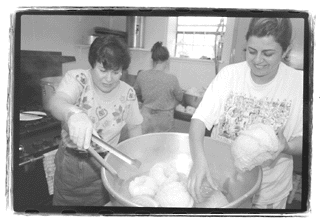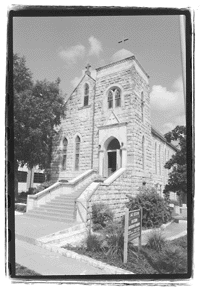Eastward Ho!
Touring the Mediterranean With the St. Elias Food Fest
By Virginia B. Wood, Fri., Oct. 10, 1997
|
|
The menus at the Methodist Church socials of my West Texas childhood were as homogeneous as the congregation. If there was even a whiff of ethnic influence other than the occasional pan of King Ranch casserole, it did not register on my palate or in my memory. Perhaps that's why I'm drawn to events such as the annual St. Elias Eastern Orthodox Church Mediterranean Food Festival. Nothing could be farther from the pancake suppers and fried chicken dinners of my memory. For 50 years, the ladies of St. Elias Church (408 E. 11th St., 476-2314) have raised funds for the church by preparing and selling a banquet of dishes that represent the cuisines of their varied ethnic heritages. The variety of the menu is a direct result of the ethnic diversity of the congregation and the festival now attracts crowds from all over Central Texas. The history of the festival is an integral part of the development of St. Elias Church. In May of 1933, a group of Lebanese Orthodox families that had previously been ministered to by traveling priests joined together to purchase land and building materials for Austin's first Orthodox Church. Though the founding families were Lebanese, the small community determined from its infancy that St. Elias would be a Pan-Orthodox Church, welcoming Orthodox worshippers of all nationalities. As the building project progressed, church women met the funding challenge by baking and selling Lebanese breads and pastries to their neighbors. When the basilica-style temple was almost completed in 1934, the ladies expanded the bake sale into an annual Lebanese dinner. As the congregation grew and diversified, the annual fundraising dinner became the Mediterranean Festival, selling delicious ethnic foods from booths on the church grounds.
Today, St. Elias Church is a blended community of diverse ethnic heritages (Lebanese, Greek, Ethiopian, Armenian, Russian, Arabic) and the Mediterranean Food Festival is a popular event that draws crowds not just from the church congregation and Austin but throughout the region. This year, for the first time, the festival will be celebrated in Waterloo Park, having outgrown the church grounds. Visitors interested in seeing the church and learning more about Orthodoxy can make the short walk from the park at 12th between Trinity and Red River to the church on 11th, where tours will be available. Festival guests will enjoy live music, dancing, children's activities, and a rich culinary tour of the Mediterranean which will include imported beers and wines of the region.
For weeks preceding the festival, the various cooking teams have been taking turns in the church kitchen, happily sharing the task of preparing foods for the big annual party. Many of the recipes are treasured family heirlooms, passed down and enjoyed by generations. Some dishes can be prepared ahead and frozen, but many must be made at the last minute to insure maximum freshness. The church kitchen will be a beehive of activity as the cooking is finished. (See recipes.)
|
|
In addition to sovlakia, Greek food lovers may find spanakopita (spinach and feta cheese pastry) and kourbiedes (melt-in-your-mouth butter cookies) along with baklava (filo pastry filled with nuts and honey). There will even be Italian cannoli, fried pastry tubes filled with sweetened ricotta cheese, nuts, and chocolate. Ababla Yosief and her team of Ethiopian cooks will prepare several signature dishes native to their homeland such as the vegetarian dishes yemisir kik we't (lentils) and ayib be gomen (collard greens with spiced cottage cheese), and a spicy beef stew called yesiga we't. Over the years, festival guests requested so many of the recipes that a small festival cookbook was assembled to sell at the party. A brand new recipe collection, The St. Elias Ladies Guild Cookbook (self-published, $12), is hot off the press and will be available for sale at this year's event.
Considering how few Middle Eastern, Greek, or African dining options are available in Austin, the St. Elias festival offers the most comprehensive Mediterranean culinary tour imaginable. For an admission fee of $5 (children under 5 free) and the cost of food and drink tickets, festival guests can experience an ethnically diverse banquet, proudly prepared in longstanding family traditions. The cooks of St. Elias offer the Arabic blessing "sagh tayn," which means "a double blessing of good health" to all those who come to enjoy the foods at the festival. The 1997 St. Elias Mediterranean Festival will take place Fri, Oct 10, 6pm-midnight, and Sat, Oct 11, noon-midnight, at Waterloo Park, 12th St. between Red River and Trinity.
Recipes
On Saturday, October 4, Samar Sakakini and the Arabic cooking team spent the entire day preparing the festival's fastest-selling item, malfoof (stuffed cabbage leaves). As chatting children passed in and out of the church kitchen after a morning at Arabic school, Sakakini and Marie Wakin cored and boiled the cabbage heads. The cabbages were then plunged into cold water to stop the cooking and the leaves separated into piles. Once many boxes of cabbages were prepared, the lamb and rice filling was assembled, and a team of willing hands quickly rolled the leaves. Pans of leaves were frozen to be finished the day of the festival so they can be served piping hot to the eager, hungry crowds. While they worked, Sakakini and Wakin explained that while a Lebanese cook may produce a slightly different version of the malfoof filling than a Palestinian cook, the rolls for the festival are made according to a recipe handed down through generations of church women. The following recipes are taken from The St. Elias Ladies's Guild Cookbook, courtesy of project coordinator Judy Keown.
Malfoof (Arabic Stuffed Cabbage Leaves)
2lbs cabbage (1 medium head)
1 cup uncooked rice (soaked in 3 cups water)
1lb lamb shoulder, finely chopped
1/2tsp cinnamon
1/2tsp cumin seed
1/2tsp salt
1/2tsp pepper
4 large cloves garlic
3tbs butter, melted
1/4 cup lemon juice
Core the center of the head of cabbage and insert the head in boiling water to wilt the leaves. Drain and separate the leaves. Drain the rice and mix with the meat. Add spices and melted butter. Roll about one tablespoon of meat and rice mixture in half of a leaf. Line the pan with leaves, add cabbage rolls, arranging evenly. Add two or three cups of water and cook covered for about 30 minutes. Add lemon juice during the first three minutes of cooking.
Ayib Be Gomen
(Ethiopian Collard Greens with Spiced Cottage Cheese)
1lb collard greens
1lb cottage cheese
1tbs black pepper
3tbs butter
salt to taste
Wash the collard greens and chop. Boil the greens in six cups of water for 5-10 minutes. Discard the water and set greens aside. Combine the cottage cheese with the black pepper and butter. Add the chopped collard greens to the cottage cheese, and salt to taste. Refrigerate to store.










